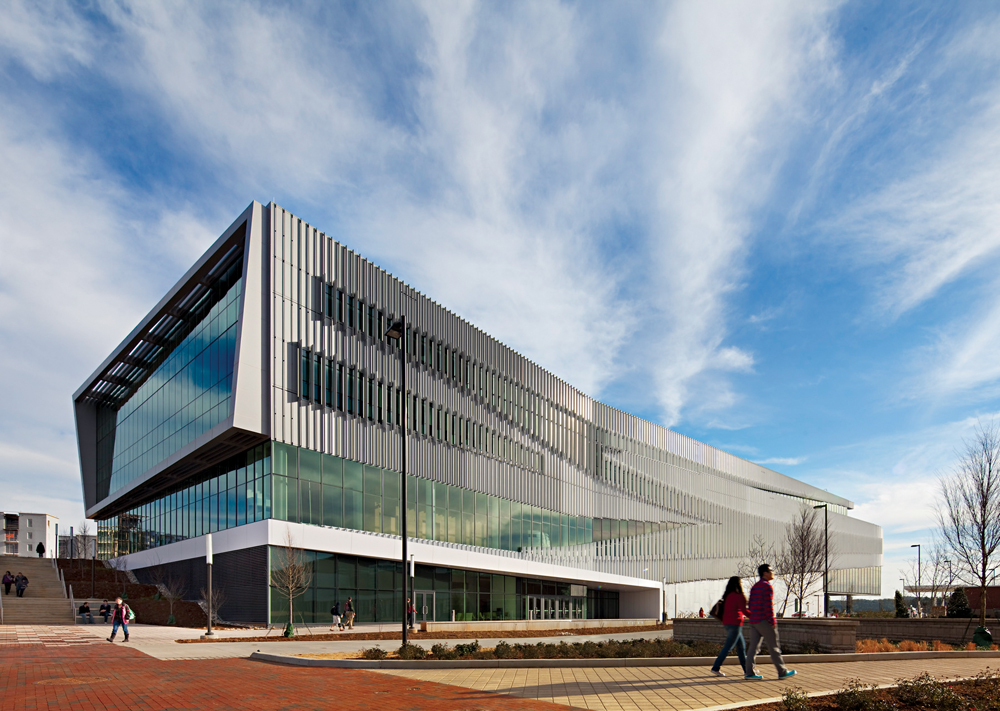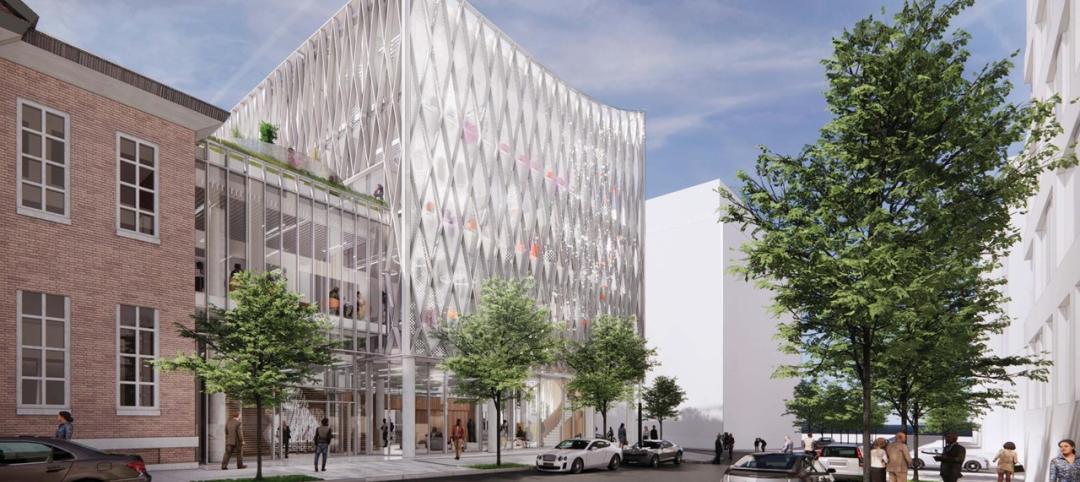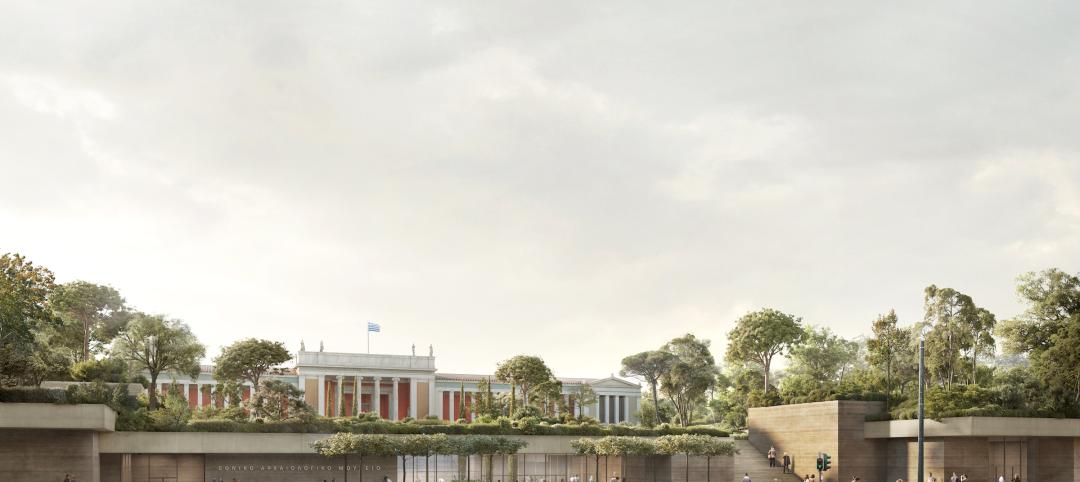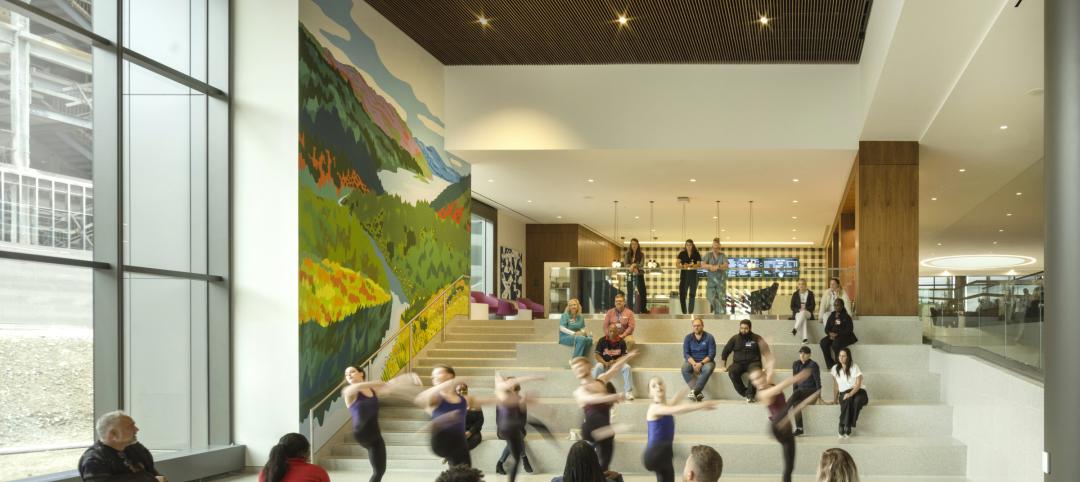Economic recovery has been slow, and the overall higher ed market is still fairly flat, according to a 2013 report by consultant Paul Abramson, using data from Dun and Bradstreet (http://bit.ly/ZiM6cQ).
Nevertheless, better investment performance is improving the mood of donors and easing some of the pressure on endowments. “The market is beginning to open up, with pent-up demand pushing projects to get funded and into design and construction,” says Steve Rhoades, Associate Principal and Client Executive at KJWW Engineering Consultants.
Recruitment pressure has convinced some clients to green-light capital projects. “One of the key drivers of growth is the need for colleges and universities to stay more competitive in amenities: more luxurious dorms, state-of-the-art athletic facilities, technologically advanced classrooms,” says Thomas Goemaat, President and CEO of Shawmut. Goemaat says his firm has seen a “significant and sustained uptick” in academic work in New England and the Tri-State region of New York, New Jersey, and Connecticut.
Large facilities that combine academic and medical objectives are capitalizing on the synergy between education, science, and clinical services. For instance, the University at Buffalo (N.Y.), whose UB2020 master plan has been simmering since 2004, will break ground this fall on its $375 million School of Medicine and Biomedical Sciences Building. At half a million square feet, the HOK-designed facility is the linchpin of UB’s plan to create a whole new Downtown Campus. The city will build a Metro station below the structure, and a children’s hospital (run by the nonprofit Kaleida Health) and privately owned medical office building will rise next door.
TOP UNIVERSITY ARCHITECTURE FIRMS
2012 University Revenue ($)1 Cannon Design $71,000,0002 Perkins+Will $49,726,5433 Stantec $36,704,0774 EYP $30,000,0005 SmithGroupJJR $25,600,0006 Gensler $22,140,0007 IBI Group $21,432,7128 Flad Architects $20,350,0009 Wight & Co. $18,072,20010 Sasaki Associates $16,865,404
TOP UNIVERSITY ENGINEERING FIRMS
2012 University Revenue ($)1 Affiliated Engineers $47,202,0002 URS Corp. $39,211,8523 AECOM Technology Corp. $33,000,0004 Buro Happold Consulting Engineers $28,695,0005 Burns & McDonnell $25,635,0006 STV $21,121,0007 Parsons Brinckerhoff $19,000,0008 Clark Nexsen $18,141,7909 Vanderweil Engineers $15,062,10010 KJWW Engineering Consultants $13,554,873
TOP UNIVERSITY CONSTRUCTION FIRMS
2012 University Revenue ($)1 Whiting-Turner Contracting Co., The $818,113,1402 Turner Corporation, The $701,340,0003 Skanska USA $437,058,2284 Structure Tone $354,907,9005 PCL Construction Enterprises $340,500,0756 Mortenson Construction $246,330,0007 Swinerton Builders $229,439,9508 DPR Construction $227,149,3779 Sundt Construction $225,748,51410 Austin Commercial $225,311,911
The partnership aspects of the UB project illustrate a trend toward creative public/private development. “There is a growing understanding that institutions can no longer afford to function independent of their host community—a change that has been driven in part by growing financial pressures,” says Mike Medici, AIA, Learning Practice Leader at SmithGroupJJR. “This is leading to an increase in community development partnerships as institutions seek to leverage their impact as ‘economic engines.’”
In Camden, N.J., Rowan University is finishing its $139 million Cooper Medical School education building—home of a new med school, the state’s first such project in more than 30 years. The curriculum emphasizes problem-based learning, with academic facilities tailored to group work plus hands-on simulations with robots and even a virtual reality CAVE. The project, designed by HDR, embodies higher ed’s current concern for programs that prepare students for a tough job market.
With thousands of traditional dorms still in use, the need for more modern residences also continues to generate work. Some responses have been dramatic, such as the 21-story Tree House just built by Suffolk Construction at the Massachusetts College of Art and Design, Boston. Amenities of the 493-bed apartment-style facility include a health center, café, and “Pajama Floor” where students can play games, watch TV, study, or work out while doing laundry. Hardin Construction (just acquired by DPR) recently delivered projects comprising nearly 2,000 beds for four academic clients in Georgia—all spurred by a desire to meet “modern consumer expectations,” according to Director of Higher Education Carlos Torres.
In another competitive strategy, some schools are replacing old-style student unions with recreation centers emphasizing wellness. Buildings may include student services offices, clinics, or classrooms for related subjects.
Auburn University at Montgomery (Ala.) positioned its 74,000-sf Wellness Center as a new front door for the entire campus. Constructed by BL Harbert International, the facility includes outdoor fields, two basketball courts, weight and cardio rooms, two multipurpose rooms, an aquatic center with outdoor spa, an indoor track, climbing wall, and juice bar, plus classrooms, lecture halls, and a lab for the Department of Physical Education and Exercise Science.
Finally, the American College & University Presidents’ Climate Commitment, now with 669 signatories, continues to influence construction. Some schools are eyeing net-zero and the Living Building Challenge for a variety of building types. And though central plants may not be glamorous, many clients now recognize the tantalizing ROI offered by improved infrastructure. In an extreme example, Rist-Frost-Shumway engineered a new 15,800-sf wood-biomass heating plant with cogeneration for Colby College in Waterville, Maine—a milestone in the school’s quest for carbon neutrality.
As in other sectors, energy performance of existing buildings is also becoming a high priority for higher ed. “The old piecemeal approach that advocates randomly adding sustainable applications won’t do the trick; more holistic building energy strategies are required,” says Vuk Vujovic, Director of Sustainable Design at Legat Architects.
Read BD+C's full Giants 300 Report
Related Stories
Architects | Feb 27, 2023
Hord Coplan Macht announces retirement of Founder/CEO Lee Coplan, FAIA, and names successor
Hord Coplan Macht, an award-winning integrated architecture, interior design, landscape architecture, and planning firm, announces the retirement of Founder and Chief Executive Officer Lee Coplan, FAIA. Lee leaves behind a long and celebrated career leading the practice over the last four decades while bringing innovative design strategies and leadership to the architecture and design community.
Libraries | Feb 26, 2023
A $17 million public library in California replaces one that was damaged in a 2010 earthquake
California’s El Centro community, about two hours east of San Diego, recently opened a new $17 million public library. With design by Ferguson Pape Baldwin Architects and engineering services by Latitude 33 Planning & Engineering, the 19,811-sf building replaces the previous library, which was built in the early 1900s, damaged by a 7.2 earthquake that struck Baja California in 2010, and demolished in 2016.
Architects | Feb 24, 2023
7 takeaways from HKS’s yearlong study on brain health in the workplace
Managing distractions, avoiding multitasking, and cognitive training are key to staff wellbeing and productivity, according to a yearlong study of HKS employees in partnership with the University of Texas at Dallas’ Center for BrainHealth.
University Buildings | Feb 23, 2023
Johns Hopkins shares design for new medical campus building named in honor of Henrietta Lacks
In November, Johns Hopkins University and Johns Hopkins Medicine shared the initial design plans for a campus building project named in honor of Henrietta Lacks, the Baltimore County woman whose cells have advanced medicine around the world. Diagnosed with cervical cancer, Lacks, an African-American mother of five, sought treatment at the Johns Hopkins Hospital in the early 1950s. Named HeLa cells, the cell line that began with Lacks has contributed to numerous medical breakthroughs.
Arenas | Feb 23, 2023
Using data to design the sports venue of the future
Former video game developer Abe Stein and HOK's Bill Johnson discuss how to use data to design stadiums and arenas that keep fans engaged and eager to return.
Museums | Feb 22, 2023
David Chipperfield's 'subterranean' design wins competition for National Archaeological Museum in Athens
Berlin-based David Chipperfield Architects was selected as the winner of the design competition for the new National Archaeological Museum in Athens. The project will modernize and expand the original neoclassical museum designed by Ludwig Lange and Ernst Ziller (1866-1874) with new spaces that follow the existing topography of the site. It will add approximately 20,000 sm of space to the existing museum, as well as a rooftop park that will be open to the public.
Multifamily Housing | Feb 21, 2023
Watch: DBA Architects' Bryan Moore talks micro communities and the benefits of walkable neighborhoods
What is a micro-community? Where are they most prevalent? What’s the future for micro communities? These questions (and more) addressed by Bryan Moore, President and CEO of DBA Architects.
Healthcare Facilities | Feb 21, 2023
Cleveland's Glick Center hospital anchors neighborhood revitalization
The newly opened MetroHealth Glick Center in Cleveland, a replacement acute care hospital for MetroHealth, is the centerpiece of a neighborhood revitalization. The eleven-story structure is located within a ‘hospital-in-a-park’ setting that will provide a bucolic space to the community where public green space is lacking. It will connect patients, visitors, and staff to the emotional and physical benefits of nature.
Multifamily Housing | Feb 21, 2023
Multifamily housing investors favoring properties in the Sun Belt
Multifamily housing investors are gravitating toward Sun Belt markets with strong job and population growth, according to new research from Yardi Matrix. Despite a sharp second-half slowdown, last year’s nationwide $187 billion transaction volume was the second-highest annual total ever.
Multifamily Housing | Feb 21, 2023
New multifamily housing and mixed-use buildings in Portland, Ore., must be ready for electric vehicle charging
The Portland, Ore., City Council recently voted unanimously to require all new residential and mixed-use buildings to be ready for electric vehicle charging. The move amends Portland’s zoning laws to require all new multi-dwelling and mixed-use development of five or more units with onsite parking to provide electric vehicle charging infrastructure.

















